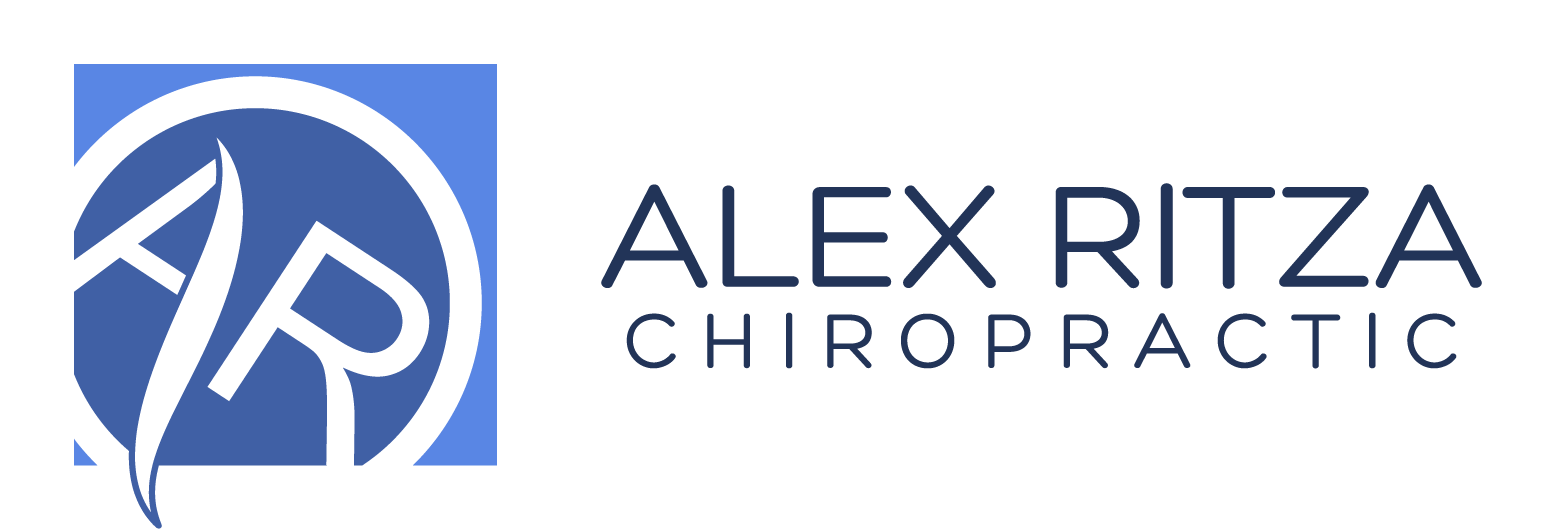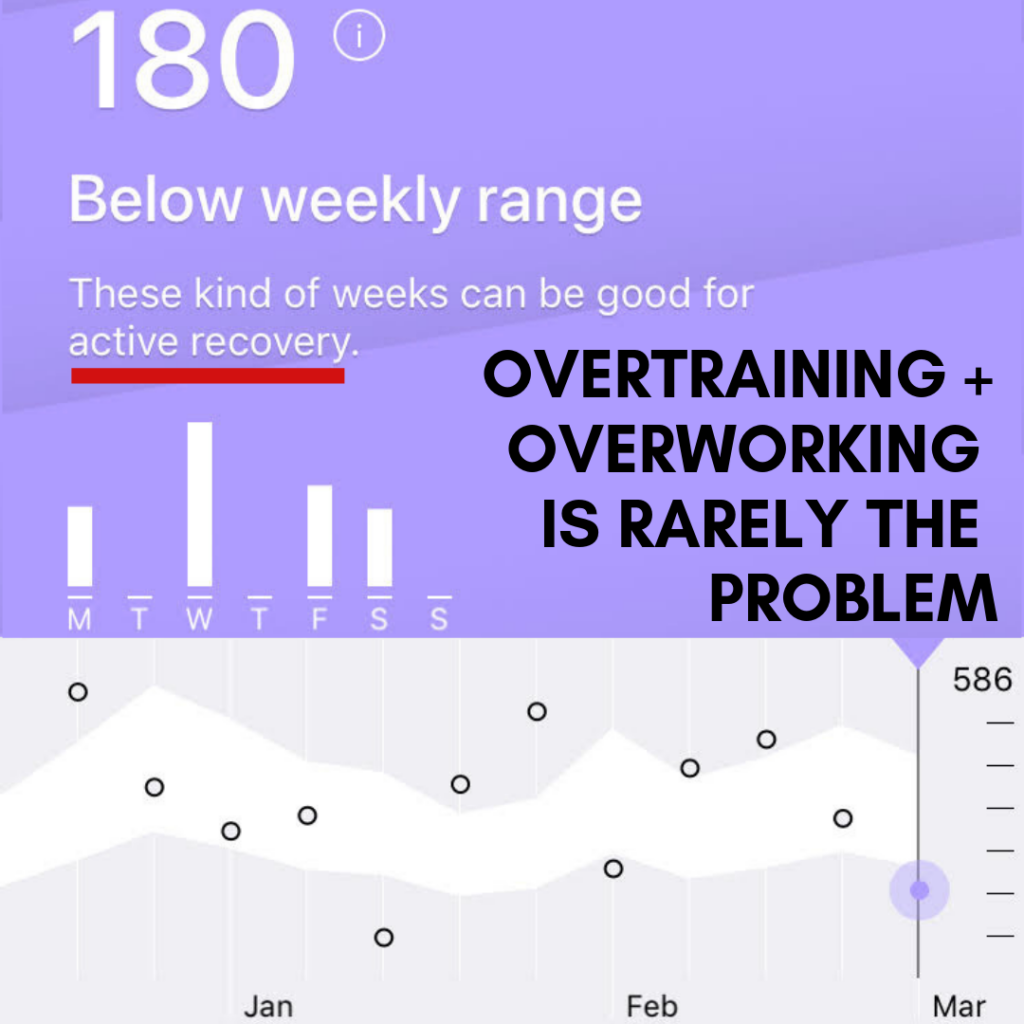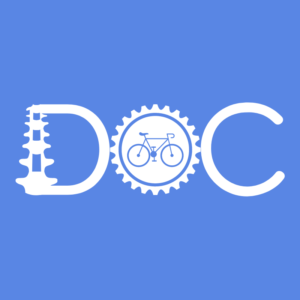If you prefer to read rather than listen, here is the transcript of my latest episode of the Better Ever After Podcast.
In this episode, we’re going to be covering a topic that’s going to apply to everybody, whether you’re an athlete or a couch potato. I’m going to try to convince you that there’s no such thing as working too hard. There’s only such thing as not getting enough rest and recovery. So in this episode, we’re going to be talking about overtraining syndrome, which is a problem that endurance athletes face where their performance goes down and they can’t get it back up, and how the underpinning mechanisms behind this apply to each and every one of us on a day to day basis. So let’s get into it. So in order for us to get bigger and faster and stronger when we’re training ourselves, we have to apply more stress physically to the body than it’s capable of handling.
So let’s say we go to the gym, we need to lift more, lift bigger weights, or do more running or cycling. We need to push ourselves beyond what we’re comfortable with and we get bigger, faster, stronger in those periods of rest when the body adapts to it – adapts to those stressors and our performance increases over time. But what can happen is, if the body has too much stress on it with not enough recovery and rest in between, and this happens for a really intense period of work or with too much intense exercise over a very long period of time with not enough rest, you can get into what’s called overreaching and overtraining. So overreaching is something that happens to endurance athletes such as during a training camp where you spend seven to 14 or however many days of really, really intense exercise with no rest. But after that, if you take a period of a break, that decreased performance that you would see after the training camp will actually lead to an increase in performance.
If you didn’t take a break after that training camp, your performance would be hindered because you wouldn’t have enough recovery and rest time for the gains to actually happen, for the body to undergo the physiological adaptations that will help you increase your performance. And so with overreaching syndrome, if you give the body days or weeks of rest after that intense exercise, your performance will actually increase. Now what can happen is if there’s a lot of stress on the body physically and it happens without enough rest and recovery time, the body can undergo some maladaptations, meaning that with too much stress and not enough recovery, the performance in your sport can start to actually go down. So if you’re lifting too much or more so for endurance athletes, if you’re pushing yourself too much and your body’s not getting enough time to rebuild the cells and to restore itself, your performance can actually go down.
And as you get to this extreme form of overreaching, which is called nonfunctional overreaching syndrome or into overtraining syndrome, it can take weeks or months of recovery time in order for your performance to go back up. Overtraining syndrome is a really severe medical problem, but thankfully it is relatively rare. The underpinning behind all of this is the body is exposed to too much stress and there’s not enough recovery time for the cells and the physiological systems to adapt to get bigger, faster and stronger. Now, as I said, overtraining syndrome is very, very rare in the large population. It’s very, very, very rare in those that just do strength training activities or activities in the gym and you are much more predisposed if you are an aerobic athlete or an endurance athlete. Some studies have shown that it can vary between 10 and 30% in terms of the lifetime prevalence, meaning that if you’re an endurance athlete for your entire life, there’s a 10 to 30% chance that you might get it at one point.
Of course, the more skilled you are, research shows you’re more likely to get this because it usually means you push yourself more and more and more, more so than your competitors were. Overtraining syndrome is really rare. Overreaching is relatively common and a lot of people listening to this podcast might have experienced it. It’s where your performance can decrease unless you take some days or some weeks to recover. And similar to overtraining syndrome, it can be associated with some signs and symptoms. Largely they’re going to be psychological, like decreased vigor, feeling fatigue, feeling malaise. Or if more extreme you might notice some neurological or hormonal changes. So thankfully most of us are never going to have to deal with these two conditions, especially if you’re working with a coach or a trainer because if you work with a coach or a trainer that’s worth any of their weight in gold, they will make sure that you have rest and recovery weeks so you don’t push yourself too hard.
So while this topic is really specific and is not going to apply to most of us in our lifetime, the importance of it is, is it has applications to all of us on our daily life. Because if there’s one thing that I noticed in chiropractic practice is that people don’t put enough respect towards recovery and rest. And I would very much argue that you could work out every single day. That you could push yourself as hard as you want. And the upper limit is really only limited by how much time you have for rest and recovery. This doesn’t just apply to exercise. It applies to almost every domain of our life because the principle is the same. Everything that we do, whether we go to the gym, whether we’re socializing, whether we’re looking at our phones, whether we’re doing work at the office, it all takes either physical or metaphysical energy.
And our body is simply not designed to work all day at a 110% whether it’s or brain and our body, it needs periods of rest and recovery so that the cells and the physiological systems can reset, can recover. And can adapt to the stress that we’re putting on them because whether we’re in the gym or whether we’re at the office, if we don’t find periods where we can rest and adapt, it’s like a bank account: Eventually with all the withdrawals you’re going to go bankrupt and it’s going to start to affect the physiological systems of the body in a negative way, which is a maladaptation. This is really just the same thing as overtraining syndrome. So whether we’re talking about being in the gym or being at the office, we can push ourselves as much as we like, but we have to have a plan of how we’re going to recover and how we’re going to bring our bodies back to that homeostasis – back to that even keel so that we can do it again the next day.
If we work an 18 hour day at the office, I think it’s doable, but not if you have to work another eight or 10 hour day the next day. There’s no way that your brain, your body, and any of the systems in it are going to be able to adapt in time so that it’s going to be sustainable over a long period. And so what I’m going to encourage you to do today with this podcast and with this idea is to put your mindset first and foremost on recovery, to respect it, to know that this is the time when the body gets bigger, faster, stronger. This is the time when you fill up the bank account and that if you’re pushing yourself in your relationships, physically at work and even mentally not taking time to rest, recover and do nothing, eventually that bank account might go to zero and you’re going to start to notice some changes in your health.
So in terms of some specifics for rest and recovery, this is exactly what we discuss in our Reset/Recovery Curriculum ebook that you’ll be able to get the link through this podcast. And this is where we discuss the different strategies that you can use to make sure that your body is getting the rest and recovery that it needs. Specifically. It’s where we talk about things like establishing a sleep routine, establishing a morning routine to ensure that your body gets the best possible night’s sleep, to taking mindfulness breaks or breaks to do nothing throughout the day so that your brain, which is designed to work in sprints and stops like the rest of the body is able to do so – small little tactical tools like this – rituals that you use on a daily, weekly, and the basis for the rest of your life. They are going to ensure that you have the best possible chance of recovery, whether it’s at the gym from the office or anything else that taxes your brain and your body.
So I really encourage you to go download that. That will give you some additional tools and strategies and specifically if it comes to working out, making sure that you’re working with professional or you have a professional level plan that accommodates for all the stressors that the body is facing. We know with overtraining syndrome there are usually other factors that are applied that lead to it in the first place. Things like additional psychological stress, lack of sleep, poor nutrition, high demands at work or in the office or really monotonous training. These additional factors are believed to be the things that push people over the top from overreaching to overtraining and I think they are the same things that apply to us in our health on a daily basis.
When we take care of people in the office, it’s very, very common to see that a neck or a back issue stemming from a problem with the spine is not simply a consequence of not moving enough or a particular injury, but is usually layered on top of some of these other triggers and issues that just push the body beyond what it can handle. So moving forward, I hope that you guys can all apply this mindset that recovery is your first and foremost priority and it is going to dictate how hard you are able to work, whether with your family at the gym or at the office. I hope that today was valuable. Hope you got a lot from this video in this podcast. Go download that reset recovery curriculum. If you think you need more recovery in your life, and I will see you guys in a couple of weeks.




